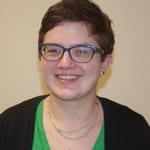The researchers painstakingly read forum threads post by post, even translating messages written in languages other than English.
With the cryptocurrency Bitcoin increasingly popular for digital transactions, the digital currency news site CoinDesk covered the research of SMU Bitcoin experts Marie Vasek, lead researcher on the study, and Tyler W. Moore, both in SMU’s Computer Science and Engineering Department in the Lyle School of Engineering.
The study by Vasek and Moore, “There’s no free lunch, even using bitcoin: Tracking the popularity and profits of virtual currency scams,” found that fraudulent schemes have scammed at least $11 million in Bitcoin deposits from unsuspecting cyber customers over the past four years.
Book a live interview
 To book a live or taped interview with Marie Vasek or Dr. Tyler Moore in the SMU Broadcast Studio call SMU News at 214-768-7650 or email news@smu.edu. To book a live or taped interview with Marie Vasek or Dr. Tyler Moore in the SMU Broadcast Studio call SMU News at 214-768-7650 or email news@smu.edu. |
Related Links
More SMU Research news
Bitcoin is the digital world’s most popular virtual currency, with millions in circulation.
The study is the first empirical study of its kind. Vasek and Moore found that hucksters used four different types of schemes through authentic-looking web-based investment and banking outlets to lure customers and heist deposits.
Vasek explained to CoinDesk journalist Joon Ian Wong how the researchers extracted Bitcoin addresses linked to the frauds, enabling them to look at transactions from victims to fraudsters recorded on the transaction addresses.
The CoinDesk article, Research: Over $11 Million Lost in Bitcoin Scams Since 2011, published Jan. 29, 2015.
EXCERPT:
By Joon Ian Wong
CoinDesk
Scams promising bitcoin riches have netted swindlers at least $11m in the last four years, researchers have found.Some 13,000 victims handed over their money unwittingly in 42 different scams over that time period, their data suggests.
However, the total amount of funds cheated from victims over this period is almost certainly higher than the estimated $11m the research identified.
A co-author of the research, Marie Vasek, said:
“There are a lot of scams that we couldn’t measure at all. There were scams we couldn’t find or verify … We think presenting our findings as they are, a lower bound, makes a lot of room for us and others to further quantify scams in this space.”
Vasek, who researches computer security at Southern Methodist University, co-wrote the paper with Tyler Moore, an assistant professor in computer science at the same institution.
Painstaking search
The paper, titled There’s No Free Lunch, Even Using Bitcoin: Tracking the Popularity and Profits of Virtual Currency Scams, has been presented at the Financial Cryptography and Data Security conference taking place in Puerto Rico this week.Vasek and Moore combed online repositories of scam accusations, including a mega-thread of scams, hacks and heists on the Bitcointalk forum that has been maintained since 2012, as well as the subreddit r/bitcoin, BadBitcoin.org and CryptoHYIPs.com.
This process required the researchers to painstakingly go through forum threads post by post, even translating messages that were written in languages other then English, as well as visiting the websites that scammers created to publicise themselves.
“We went through every single post to determine if the scheme was a scam, any associated bitcoin addresses with the scheme, and any associated scams,” Vasek said.
Using this method they found 349 scams, which were then whittled down to 192 deceptions after excluding phishing, malware and pay-for-click websites, which fall outside the scope of the study.
Follow SMUResearch.com on twitter at @smuresearch.
SMU is a nationally ranked private university in Dallas founded 100 years ago. Today, SMU enrolls nearly 11,000 students who benefit from the academic opportunities and international reach of seven degree-granting schools. For more information see www.smu.edu.
SMU has an uplink facility located on campus for live TV, radio, or online interviews. To speak with an SMU expert or book an SMU guest in the studio, call SMU News & Communications at 214-768-7650.
By Margaret Allen
Senior research writer, SMU Public Affairs
View Archive →

 Teen girls report less sexual victimization after virtual reality assertiveness training
Teen girls report less sexual victimization after virtual reality assertiveness training Women who are told men desire women with larger bodies are happier with their weight
Women who are told men desire women with larger bodies are happier with their weight Fossil supervolcano in Italian Alps may answer deep mysteries around active supervolcanoes
Fossil supervolcano in Italian Alps may answer deep mysteries around active supervolcanoes SMU seismologist Brian Stump named AAAS Fellow for distinguished scientific contributions
SMU seismologist Brian Stump named AAAS Fellow for distinguished scientific contributions Study: Contraception may change how happy women are with their husbands
Study: Contraception may change how happy women are with their husbands Study funded by NIH is decoding blue light’s mysterious ability to alter body’s natural clock
Study funded by NIH is decoding blue light’s mysterious ability to alter body’s natural clock